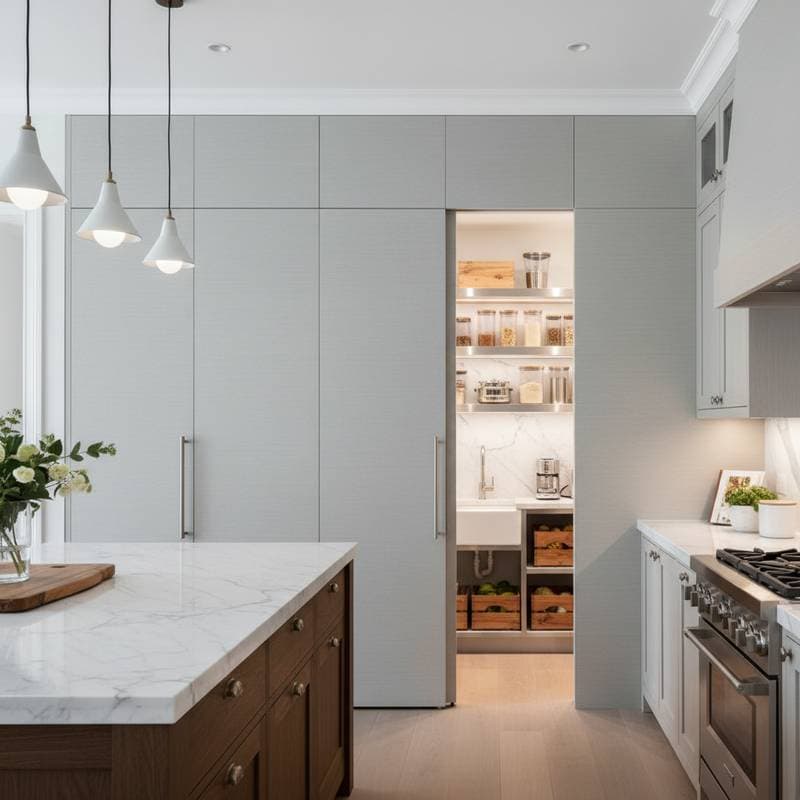Hidden Pantry Walls: A Smart Upgrade That Boosts Home Value
Hidden pantry walls represent a clever fusion of design and functionality in modern kitchens. These installations conceal storage behind seamless panels, creating a clutter-free appearance while maximizing space. Homeowners who incorporate this feature often see a return on investment through increased property appeal, with estimates suggesting a potential 6 percent uplift in overall home value.
This upgrade appeals to buyers seeking efficient, stylish living spaces. It transforms underutilized walls into practical storage solutions without disrupting the kitchen's aesthetic. As trends lean toward minimalist designs, hidden pantry walls position a property as forward-thinking and desirable in competitive real estate markets.
Understanding the Value Boost
The 6 percent value increase stems from enhanced functionality and visual appeal. Real estate experts note that buyers prioritize kitchens with innovative storage, as it signals thoughtful design. A hidden pantry wall addresses common pain points like visible clutter and limited organization, making the home feel larger and more modern.
Market data supports this trend for 2025, where sustainable and space-efficient features command premiums. Properties with such upgrades sell faster and at higher prices, particularly in urban areas where square footage comes at a premium. The investment pays dividends not just in resale but in daily living convenience.
Cost Breakdown and Budgeting
Installation costs for hidden pantry walls typically range from $4,800 to $12,000, depending on size, materials, and complexity. Basic setups using standard plywood and off-the-shelf hardware fall toward the lower end, while custom designs with soft-close mechanisms and integrated lighting push expenses higher.
Key factors influencing price include:
- Materials: Solid wood panels cost more than laminate but offer durability and a premium finish.
- Labor: Professional installation by licensed carpenters ensures precision, adding $2,000 to $5,000.
- Size and Features: Larger walls or additions like adjustable shelving increase the total by 20 to 30 percent.
To budget effectively, homeowners should allocate 10 percent extra for unforeseen adjustments, such as utility relocations. Financing options like home equity loans can spread costs, making the upgrade accessible without straining immediate finances.
Design Considerations for Maximum Impact
Selecting the right design enhances both usability and resale potential. Consider the kitchen's layout to integrate the pantry seamlessly, avoiding interference with workflows or appliances. Opt for neutral panel finishes that match existing cabinetry for a cohesive look.
Popular options include:
- Full-wall systems: Ideal for expansive storage, concealing shelves up to 24 inches deep.
- Partial panels: Suited for smaller spaces, focusing on high-use items like dry goods.
- Smart integrations: Add LED lighting or pull-out trays for added convenience.
Consult with a designer early to visualize outcomes. Digital tools or samples from cabinet suppliers help refine choices, ensuring the final product aligns with personal style and market preferences.
Maintenance and Longevity
Hidden pantry walls demand minimal maintenance when constructed with quality materials. Regular care preserves their appearance and functionality, extending the lifespan beyond a decade.
Essential Maintenance Steps
- Wipe down panels monthly with a damp cloth to remove kitchen residues.
- Lubricate hinges biannually using silicone spray for light-duty models to prevent squeaks.
- Check door alignment annually; adjust as needed to avoid sagging from frequent use.
- Repaint or restain exposed surfaces every 10 years, especially in humid environments.
Warranty Essentials
Cabinet hardware often includes warranties from one to five years, covering defects in mechanisms. Custom carpentry typically comes with at least 12 months of workmanship assurance from reputable contractors. Retain all receipts and material documentation to support claims and demonstrate quality during home sales.
Common Wear Points
Hinges and magnetic latches tend to show wear first due to repeated operation. Prompt replacement maintains the unit's seamless integration. Panels themselves prove resilient, rarely needing attention beyond cosmetic touch-ups.
Installation Process
Bringing a hidden pantry wall to life requires careful planning and execution. Begin with precise measurements of the target wall, accounting for adjacent utilities like electrical outlets or plumbing.
Step-by-Step Guide
- Assess the Space: Verify no load-bearing elements or ventilation lines obstruct the area; consult a structural engineer if unsure.
- Design the Layout: Sketch shelf depths, typically 12 to 18 inches, and decide on door type—pivot for tight spaces, hinged for easy access, or sliding to save room.
- Source Professionals: Obtain detailed quotes from at least two licensed carpenters or cabinet specialists, specifying materials and timelines.
- Procure Components: Order specialty items like reinforced hinges early, as supply chains can delay projects during peak seasons.
- Prepare the Area: Remove nearby items, protect floors with drop cloths, and ensure clear access for installers.
- Final Checks: Post-installation, test the door's operation repeatedly; confirm even gaps and secure closures.
Timelines vary from three to seven days for standard projects. Working with experienced pros minimizes disruptions and guarantees a polished result.
Realizing the Benefits
A well-executed hidden pantry wall elevates kitchen efficiency while subtly enhancing property worth. It conceals everyday essentials, streamlines meal prep, and contributes to a serene atmosphere. Homeowners enjoy immediate practicality, and sellers gain a competitive edge in showcasing innovative features.
Investing in this upgrade reflects foresight in home improvement. With strategic planning, it delivers lasting value, blending form, function, and financial return.









